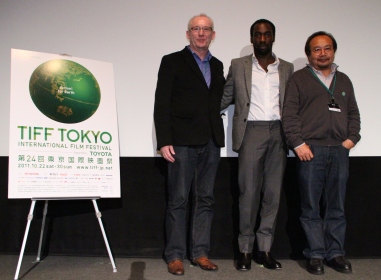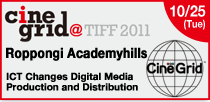Winds of Asia Middle-East SHIIKU Q & A with Director Rithy Panh, Script Writer Michel Fessler and Actor Cyril Guei who played the role of American pilot, was held with the screening on Oct. 23 (Sun).

©2011 TIFF
The film is an adaptation of the short story titled, Shiiku, which was written by the Japanese author Kenzaburo Ooe and takes place in 1972 Cambodia. The naïve and mesmerized Cambodian child narrates this story, in the film about the black soldier who was taken as a prisoner but treated merely as an animal that needed to be taken care of.
Director Rithy Panh greeted the audience first by thanking the audience for coming to the screening and said he will gladly answer to the questions for the audience of the Q & A session. Actor Cyril Guei mentioned that this was his first visit to Tokyo-Japan and was glad to visit a place where he has never been and was honored to be welcomed by the audience here. Script Writer Michel Fessler said that he was happy to be able to talk before the audience in Tokyo and felt that he was privileged for being able to visit the country of Kenzaburo Ooe, the author of the story which this film was adapted from and sent homage to Ooe.
This screening would be the first time for Writer Michel Fessler and Actor Cyril Guei to see the completed film on the big screen. Shiiku is the short story which was written in 1958 by Kenzaburo Ooe when he was merely 23 yrs of age and won him the prestigious Akutagawa Prize. The film, SHIIKU, was adapted from the short story that Ooe wrote.
Q: Tell us the reason why you made this film?
Director Rithy Panh: I’ve always wanted to depict a situation in my film where a child would be entangled in the revolution and army. I have been reflecting on this idea for a long time and that was when I read Kenzaburo Ooe’s literature. I began reading Ooe’s writing about Hiroshima to start with and then began to read the other fictions as well. I also liked his ideas against the atomic bomb or commitment to pacifism and really respected his humanitarian activities. That is the reason why I decided to adapt his literally work into a film. I would like to thank Mr. Ooe for giving me the permission to adapt his short story in to my film.

©2011 TIFF
Q: The place which your film took place was in Cambodia and the period was during the Vietnam war, which is different from Ooe’s Shiiku, which takes place just before the end of Second World War. The idea of the communication between the boy and the American pilot is similar but the character of the boy in the film is set as a soldier who is much closer to the act of war. What part of the idea did you want from Ooe’s original story and what did you want to add to it as your original idea?
Michel Fessler: I consulted with the Director on how to dramatize this story into the film when we decided to make an adaptation. Obviously the period and the country which the film takes place is different and we had to adapt to the change. We were dealing with the different war. That was how we depicted the realism in the film. A boy was not a soldier in the beginning. He was a farmer just like other children or folks of the village. I discussed with the director on ways to depict story of a child who will become poisoned and infected by ideology and finally turning in to a soldier. We knew that the little change was needed to adapt a literally work into a film. By making the certain differences, we could actually return to the original structure and matrix of the Ooe’s Shiiku and portray the excitement and strength of his story.

©2011 TIFF
Q: What was the reason for participating in the film?
Actor Cyril Guei: I had a chance to see the film directed by Rithy Panh titled S21 (S21: La Machine de Mort Khmere Rouge). This was a documentary film about Cambodia and I learned that he was truly committed to Cambodia. He told me about the Ooe’s story and the scenario he was working on when I met him later. I was very impressed with him and also began to hold doubts about the conditions of human being and really wanted to act in his film.
Whether film or literature, when you meet the work that depicts the truthful conditions of the human being, it’s similarity with the present age begins to carry a meaning, giving us an opportunity to think about humanity of the citizens that live in the world. I believe this is a good film.

©2011 TIFF
Q: Did you use real actors for children and the adults of the village?
Director Rithy Panh: The only professional actors in this film were the leader of Khmer Rouge and Cyril Guei. All the others were real villagers, but I really thought they acted very well. They have been living in the village and that is why some of them have experienced the truth about the revolution. In this case, the professional actors had to adapt to the ways of the villagers during the shooting.
Q: Did they act very well?
Director Rithy Panh: The children from the city couldn’t have climbed the tree or catch the water buffalo like the children from the village. Although some villagers have not gone to the school, they had artistic talents and passion to act. They have proved that they could analyze the role that they played and acted in the film. The villagers were very gentle people and the boy that acted the leading role was also very nice in real life, but they played the part of the villain this film.
Q: The dialogue “I can’t escape from the chain-reaction of the war” which the boy says to Cyril Guei was very impressive.
Michel Fessler: This is the dramatization that Rithy and I came up with in order to make the film realistic. This dialogue is not in the original short story, but I believe this dramatization connects our film to the spirituality and strength that is in Ooe’s work.
Q: Does it feel scary to be really attacked by group of children?
Cyril Guei: It is a very fearful experience to be attacked by the group of children or youngsters. That is because children have no sense of control. They attack without understanding what is right and what is wrong. In such a situation the prisoner will begin to think what would happen if he escaped from the cage. And acting wise, I was afraid that I would regret if somebody hit me where it hurts and I became violent.
SHIIKU












